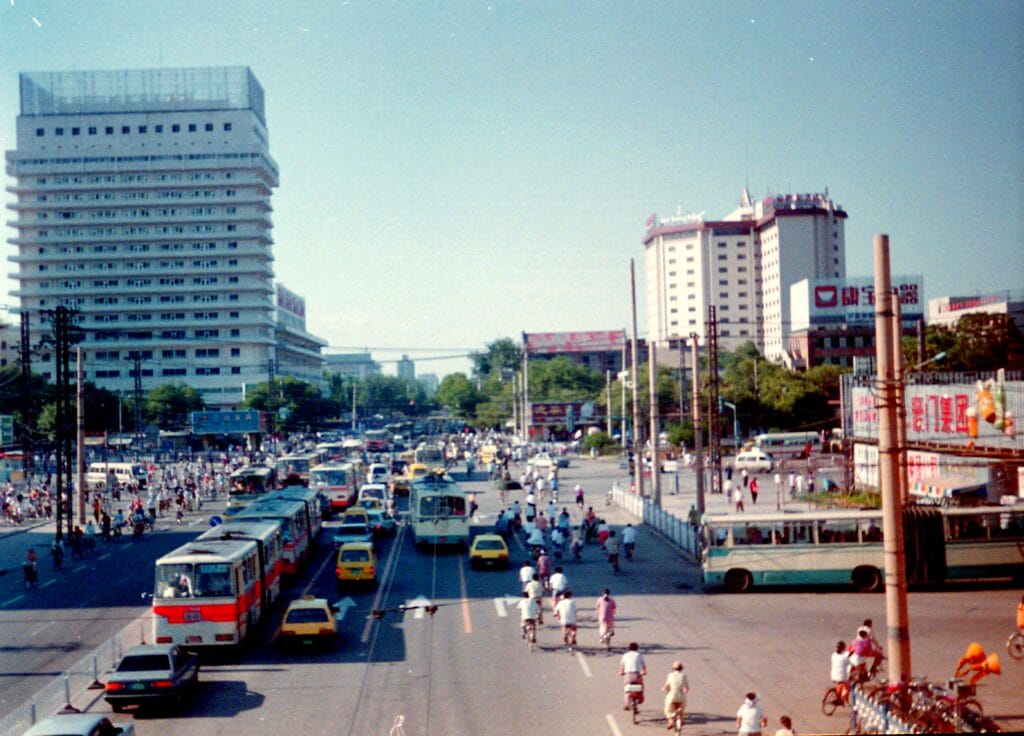<< Read all John Kamm Remembers stories

Following my first meeting with the Ministry of Justice (MOJ) in October 1991, I made 18 trips to Beijing before the end of 1994 – an average of one trip every two months. At a meeting with Vice Minister of Justice Jin Jian and Deputy Director of the Ministry’s Prison Administration Bureau Wang Mingdi in April 1992, I was given the green light to ask about any prisoner incarcerated in one of the approximately 700 prisons and 300 reform-through-labor camps administered by the Ministry of Justice.
Thereafter I would prepare lists of 20 names and fax them to the Ministry of Justice prior to visiting Beijing. The lists were simple. In the left-hand column was the province where the prisoner was serving his or her sentence. (In those days, before the opening of the Yanshan Prison in Hebei, all prisons were administered by provincial prison bureaus.) In the middle column was the prisoner’s name in pinyin. In the right-hand column were the Chinese characters for the prisoner’s name.
Upon my arrival in Beijing I would confirm the date and time of my meeting with Wang Mingdi with the MOJ’s Department of Judicial Assistance and Foreign Affairs through my host organization, the China Council for the Promotion of International Trade. Once that was settled, I would leave the hotel for the Ministry’s headquarters, making sure to arrive promptly.
In the early 1990s, the MOJ was headquartered in a drab, rather run-down building down a dusty road off the main highway to Beijing’s Capital Airport. Outside the gates of the headquarters were several shops, including a bicycle repair business, and in front of this there was a pool table where locals, including prison officers, played billiards.
After I entered the MOJ’s headquarters, I was shown to a room where I was received by Deputy Director Wang and an assistant from the foreign affairs department. Out would come my most recent list. Wang Mingdi would read from a document that provided basic information on the prisoner including correct name in characters, aliases if applicable, age, gender, ethnicity, place of residence, details of detention and trial, name of prison, and, sometimes, information on health and behavior. The latter information was useful in determining if the prisoner was eligible for sentence reduction, parole, or medical parole.
Wang Mingdi would never give me a copy of the document he was reading from. Instead I had to copy down what he said, word for word. This was a laborious process taking well over an hour. Typically, I would receive information on around 80 percent of the prisoners I asked about.
In October 1994 I was preparing to visit Beijing on my last trip of the year. On October 31, I faxed a letter to Wang Mingdi with a list of 20 names as an attachment.
I arrived in Beijing on November 26 for an eight-day visit. After assisting a business client carry out a technical seminar and making a presentation on the recently concluded congressional elections to the Chinese People’s Institute of Foreign Affairs, I set about meeting with interlocutors with whom I discussed human rights. I was disappointed to learn that Wang Mingdi was not in Beijing. Since he was the only one in MOJ authorized to provide information to me on prisoners, it looked like I would leave Beijing empty-handed.
I was fortunate however to meet Minister Zeng Jianhui, head of the State Council Information Office, on December 2, and he agreed to accept the list I had sent to Wang Mingdi. He also accepted a clipping on the three counterrevolutionary prisoners in Jilin who had been given long sentences for establishing a counterrevolutionary group. In our conversation, I also asked Minister Zeng to see if he could find out anything about Ren Wanding, a veteran democracy activist who had entered the grounds of the US embassy during the violent aftermath of the June 1989 protests. The US embassy subsequently turned him over to the police; he was sentenced to seven years in prison in January 1991.
To my surprise, Minister Zeng offered to find out the information and send it to me by fax in Hong Kong. I was skeptical. China had never given a detailed written response to a prisoner list, and to do so over an open fax would be highly unusual.
I returned to Hong Kong. Two weeks after my meeting with Zeng Jianhui, I received a fax with information on 16 prisoners, including all three of the Jilin counterrevolutionaries and Ren Wanding. Thirteen of the responses concerned prisoners on the list I sent to Wang Mingdi on October 31. One of those prisoners was Ge Hu, a teacher in Shanxi Province who had been sentenced to seven years in prison for “counterrevolution” in 1990. One week after faxing my list to Wang Mingdi, Ge had been granted medical parole.
Two other counterrevolutionary prisoners on the list, Hao Jinguang and Zhang Chengjian, received sentence reductions in the months following the response to my list. They were released from prison early. Unfortunately, others, including Ren Wanding, were destined to serve their entire terms.
In the years that followed the written response to my list, I and Dui Hua have submitted hundreds of prisoner lists with thousands of names to the Chinese government. We have received responses on more than 1,000 prisoners, and many of them have been granted clemency. The breakthrough took place in December 1994. Six months later, the Ministry of Justice stopped responding to my lists in large part because of the sharp deterioration in US-China relations that took place in the wake of the visit by Taiwan president Lee Tenghui, but by then precedent had been established. When responses resumed in 1997, they were made for the most part in writing, a practice that has continued to the present day.
Listen to the Encounters with China podcast.
Subscribe to receive notifications about new episodes.
Read all John Kamm Remembers stories.
